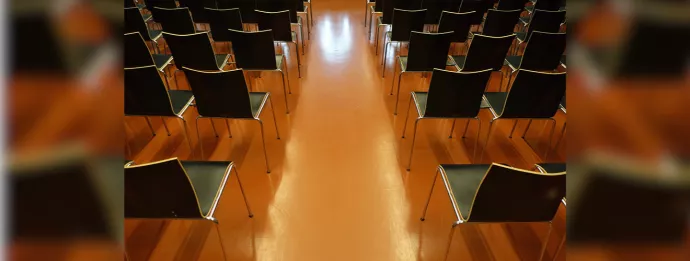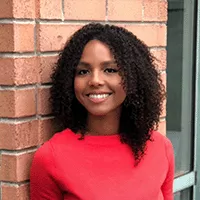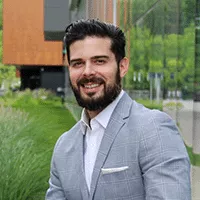
Early-Career Researchers Recognized at 2023 Research Prize Symposium
This November attendees gathered online to celebrate the recipients of UTM's Annual Research Prizes — an award established in 2016 by the Research Office that recognizes the contributions of early-career researchers and scholars in the Humanities, Sciences, and Social Sciences.
The event was MCd by Vice-Principal, Research and Professor of Physics, Kent Moore and Elspeth Brown, Professor of History and UTM's Associate Vice-Principal, Research - Strategic Initiatives. The pair warmly welcomed guests and opened with a Land Acknowledgement before turning to the three recipients, each of whom delivered a brief talk introducing their work.
This year, Professor Nicole Charles from the Department of Historical Studies was awarded the 2023 prize in the Humanities for her interdisciplinary approach to questions and issues of care, affect, healing, gendered and racialized risk, technoscience, and coloniality in the Black Atlantic. Both recipients of the Social Sciences and Sciences prizes came from the Department of Anthropology: Professor David Samson selected for his contributions to the study of biological anthropology, primatology, and human evolution, as well as sleep and cognition; and Professor Lauren Schroeder for her study of biological anthropology, palaeoanthropology, hominin variability, evolutionary theory, and quantitative genetics.

"This award will support my collaboration with Caribbean feminists in the region, and help in the dissemination of our work through public curatorial and exhibition initiatives."
"Increasingly necessary, undervalued, and under attack," said Professor Charles, who started her talk describing humanities education and the skills it offers. As a Black feminist humanities scholar and educator, the award affirms for Charles the "urgent need to question seemingly unquestionable colonial binaries that shape ideas of gender, race, nationality, sexuality, class, and more."
Speaking on our relationship to the interconnectedness of the many global struggles that plague humanity and which humanities research is trying to take up, Charles spoke to the critical and analytical perspectives offered to us through humanities scholarship, across the fields in which she works.
"How we relate to these struggles says a great deal about our willingness to acknowledge, elevate, and appreciate the fight of the oppressed," said Charles, "and it calls to the fore the critical feminist practice of anti-colonial solidarity, a reminder to hold a mirror to un-interrogated allegiances to the State."
Charles thanked the OVPR for organizing the event, and expressed her deep appreciation for her colleagues in the Department of Historical Studies and, in particular, to award nominator Kristen Bos. "To be seen and read with such care and generosity by my feminist peer is itself deeply rewarding," Charles added, "and a reminder that I am never alone on the page and in this work."

"This award is an affirmation of the importance of understanding our evolutionary roots and their impacts on modern-day behaviour."
In his talk, Professor Samson spoke about the evolutionary paradox he calls "The Human Sleep Paradox." At its core, he explained, is a defining human characteristic: our sociality.
Samson pointed to how sleep affects our mind, bodies, and well-being, asking the audience to think back to a time they struggled with sleep deprivation, and those effects not only on their day, but on their physical health and emotional regulation. The science is clear, said Samson. Sleep is crucial for human performance.
"Humans sleep the least of any primate yet recorded on the planet," he said, noting that it begs the question why we are so dependent on sleep, yet we are doing it the least. "It's the question that has driven my research."
Several years ago, he and his colleague Charles Nunn proposed the idea that throughout evolutionary history, something has been whittling away the total sleep time of humans — and doing it in a very specific way. Since then, Samson's been exploring how sleep has evolved over time, and believes that a safe, secure sleep site is a crucial part of the human story.

"This recognition of my research is an honour, and inspires me to continue pushing the analytical boundaries of traditional palaeoanthropology."
Professor Schroeder introduced herself to the audience, sharing a bit about her background, and then spoke about the two topics she and her team in the Schroeder Lab are working on. Schroeder studies the evolution of humans and our early ancestors using fossil data, her research focusing mostly on deconstructing evolutionary processes.
First, they're using methods from evolutionary quantitative genetics to quantify how morphology varies between groups; they're trying to answer to what extent random genetic drift — or chance changes — contributed to human and primate evolution.
"Adaptation via natural selection is not the sole process in evolution," Schroeder pointed out. "It's only one part of a combination of both adaptive and non-adaptive processes."
Second, she looks at hybridization and gene flow — another non-adaptive evolutionary process that has been at work in human evolution. The lab is part of a larger inter-institutional project to determine the morphological effect of gene flow and resulting hybridization on the skeleton in living mammal hybrids. The goal is to create a model for identifying hybrids in the fossil record.
Schroeder shared photos of some of the fossils she's studied, which range in geological age from 3 million years to around 200,000 years old.
Do you know of an outstanding early career researcher at UTM? Consider nominating one of your colleagues! The next call for nominations will take place in spring of 2024. Learn more about the UTM Annual Research Prizes.
Mark your calendars! Join us at CDRS on November 30th at 1:00PM for the 2023 Desmond Morton Annual Research Excellence Lecture — an in-person event celebrating award recipient Professor David Wolfe from the Department of Political Science.
